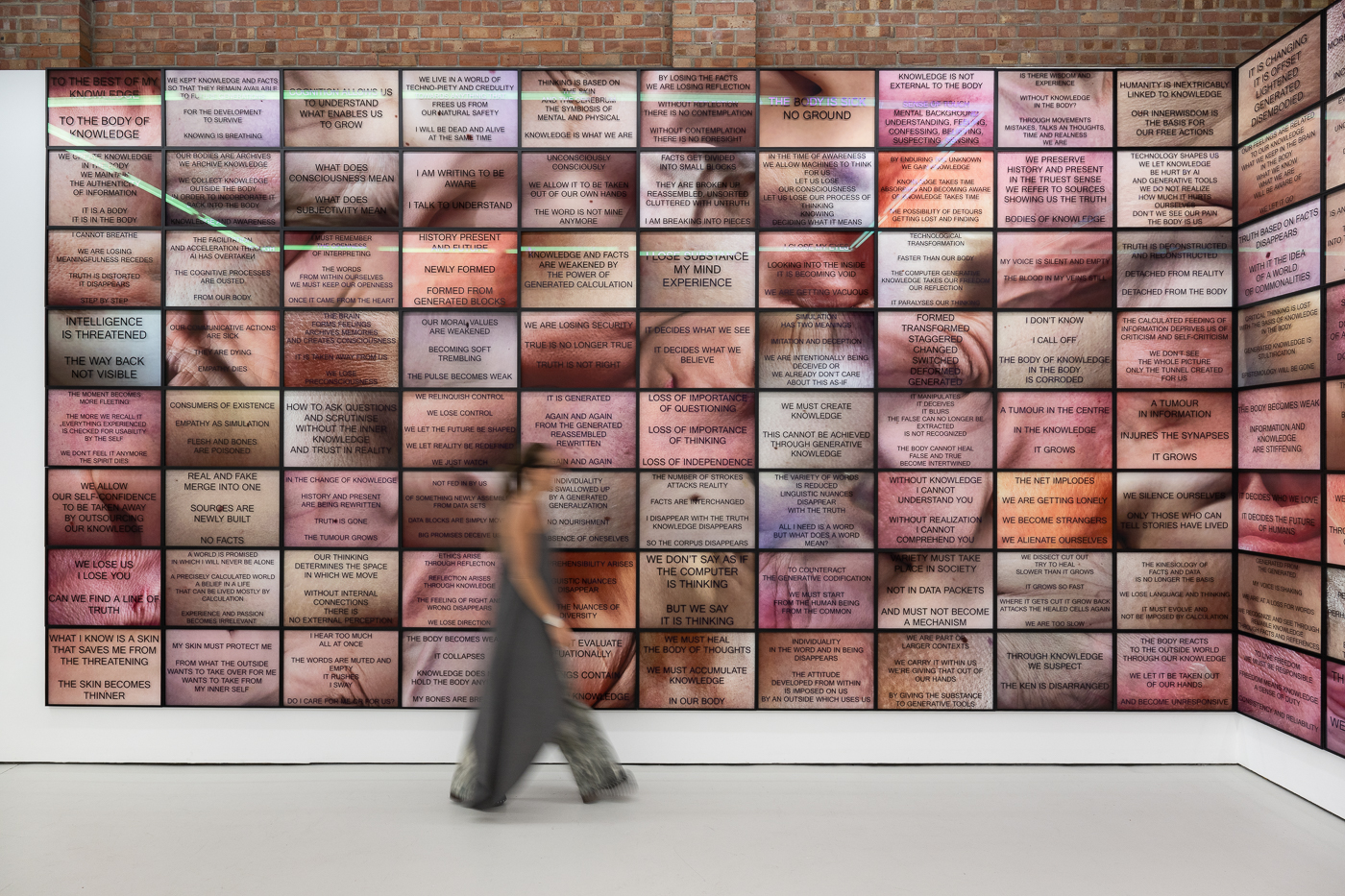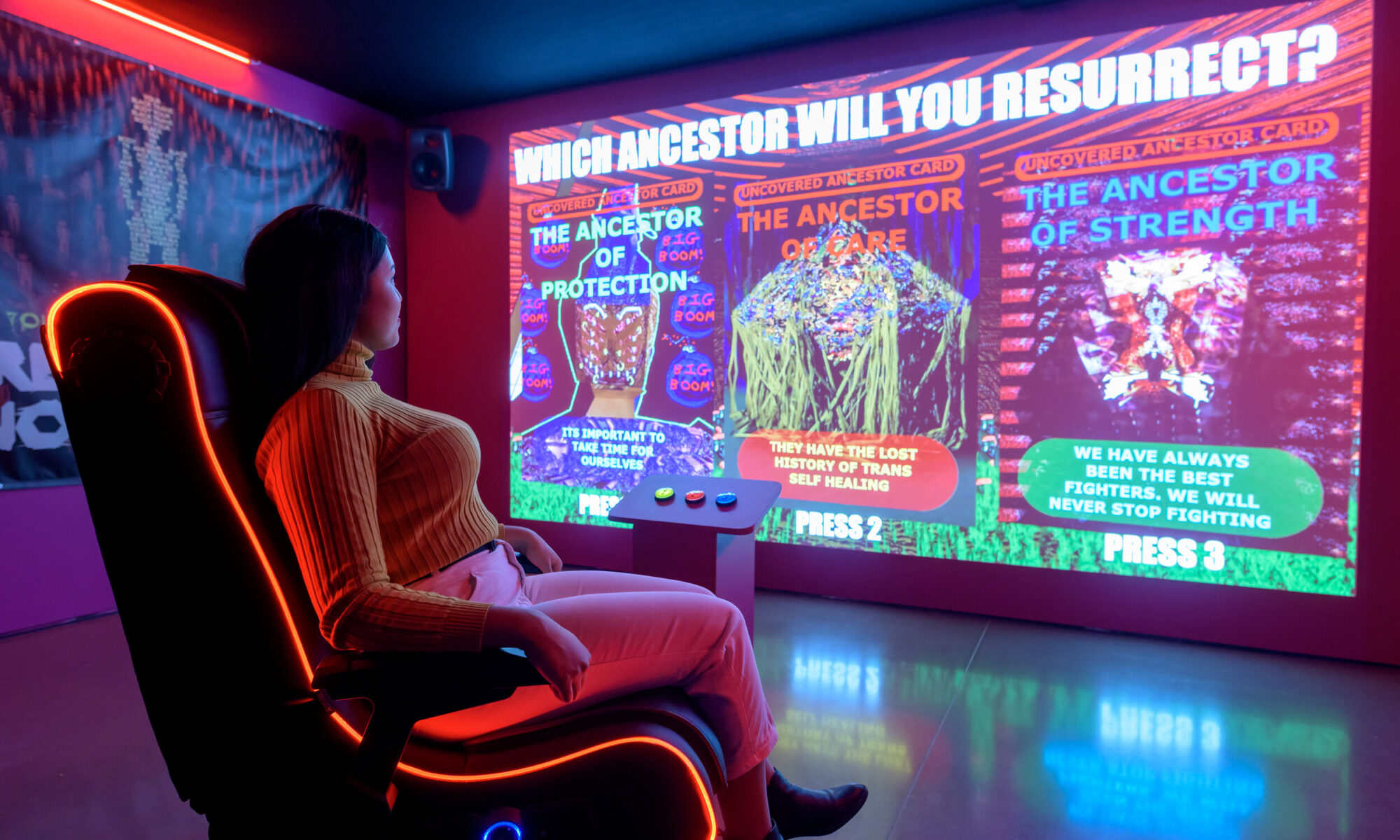Danielle Brathwaite-Shirley has spoken to Tamara Hart of AQNB, resulting in a powerful conversation about the economy of trauma, jouissance in Black death and the power in not passing.
Dining on trauma: Danielle Brathwaite-Shirley talks trans-tourism, motherhood, & being a “Freaky Friday everyday”
By Tamara Hart
“I turn to archiving because I think archives have really failed Black trans people,” notes artist Danielle Brathwaite-Shirley over a Zoom call in Berlin, where she’s been quarantining with her partner. The two are embarking on a journey of shared motherhood, an experience the London-based artist is eager to embrace. “It’s given me fuel,” she continues, “I’m not just trying to keep alive for myself, I’m trying to keep alive for my child and change things so that my child has a broader array of choices than I did.”
One of the ways in which Brathwaite-Shirley is working to change perspectives for future generations is by archiving Black trans experiences. Her most recent project WE ARE HERE BECAUSE OF THOSE THAT ARE NOT, presented at Science Gallery in London earlier this year, is an interactive video game archive that centres the thoughts and feelings of her community, those often erased from historical narratives. Combining animation, sound, and game design, Brathwaite-Shirley’s practice speaks for the silenced, for her unarchived Black trans ancestors whose experiences are lost. She desires to resurrect these forebears, to meet their buried bodies, and to preserve their lives beyond moments of pain and trauma.
What Brathwaite-Shirley’s work explores is precisely the cultural politics of consuming such pain, or what she calls “dining on Black trans trauma”. In ‘TRANS-PORT ME’, a karaoke-style video with a hip hop, techno-goth melody, a voice explains, “we are taught that our trauma must be shared to be believed,” the spoken words continue, sighing. “Or that allyship is resharing images or stories of Black and trans trauma without thinking how you sharing plays into how consumable images of Black and trans trauma are.” This narration echoes psychological theorist Derek Hook’s argument that the circulation of Black trauma is part of a fantasy of deserved pain. He asserts that there is satisfaction taken in disseminating images of tortured Black bodies, which are inflicted with violence they are thought to deserve.
One can argue that Black trans bodies are even further degraded in this social imaginary. Constantly in a state of vulnerability, they are doubled in their othering, which is used to justify their suffering. This is re-iterated in Brathwaite-Shirley’s work ‘Digging For Black Trans Life’, in which a talk show host prompts a monstrous trans ‘object’ (a de-subjectivised other) to speak about their pain and trauma, rather than validating their experiences of love or empowerment. The artist reminds us that when we dine on Black trans trauma, we are not elevating the visibility of these communities; rather we are using them as an exotic spice to enhance the (cis) white palette. Feminist theorist bell hooks’ idea of “eating the other” comes to mind; hooks asserts that Black experiences are often commodified in order to re-inscribe white supremacy with culturally relevant narratives. Similarly, Black trans experiences are viewed as unexplored playgrounds where existing power structures are re-asserted rather than undermined. The artist’s use of gaming technology is a reminder that archives are not objective. Rather, they are often appropriated into eSports—games in which the lives of those portrayed are distorted in order to validate dominant social narratives.
As Brathwaite-Shirley prepares for upcoming solo shows at arebyte Gallery, London and QUAD, Derby, the artist discusses her views on the economy of trauma, jouissance in Black death and the power in not passing.
**To start, it sounds like your journey as a mother has deepened your perspective in many ways. How does motherhood translate to your ideas of Black trans futures?
Danielle Brathwaite-Shirley: Often we have mothers in trans society. We call someone who looks after a lot of trans people ‘mother’. We have our own motherhood, but it’s interesting having a child now. It just makes me super excited to be a trans mom. I was trying to find a book by Black trans moms and I couldn’t find one. I’m trying to be more open and figure out ways to have hard conversations and make [ideas] more understandable and accessible to minds that are younger than mine.
**One way of making these ideas accessible is through your project Black Trans Archive, which explores Black trans experiences through an interactive digital game. What does the process of archiving mean to you in this context?
DBS: Often when you look back to find queer history or Black and trans history it doesn’t exist, because they were not recorded or failed to be recorded in the ways that they should have. The only Black and trans account I actually found was a poster of a trans woman—a really horrible poster—telling you to be weary of her and all this nonsense. And so that kind of sparked me into saying we need to start making our own archives because when we leave the archiving to someone else, often they repeat the violence that is on our bodies in daily life. It was about trying to find a way of communicating how we live and think […] allowing us to use fiction to tell a story, to create an environment that possibly could record us and could store our experiences.
**In the beginning of the game, it states that the player’s subjectivity will influence their access to and experience of the archive. In short, there are terms and conditions.
DBS: The reason that’s all in there is because originally I was going to make an archive game [just] for Black trans people. But then we came up with questions like ‘Okay, so what happens when a white cis person plays?’ We were like, ‘God, actually we don’t want them to play as if they’re seeing our experiences […] stepping in our shoes’. It’s not about stepping in our shoes; it’s not about that, because you couldn’t, it’s impossible.
So we came up with these terms and conditions. If you pick cis or trans you get terms and conditions. But if you pick Black and trans you don’t, because [the archive] trusts you. And there was this idea that not everyone can be trusted with an archive. So we wanted to really think about how this person’s access needs to be particular because they only have a certain set of experiences.
We’re not trying to permit—I call it ‘trans-tourism’. This idea that someone would come and learn, or that a fantasy of theirs would be met. And it came from often [being expected] to make work about some kind of pain, something bad to do with transness; rather than loving transness, rather than appreciating a Black trans person. So it was really rallying against that, saying, ‘Actually, no. You’re not here to see what you expect to see, it’s about your identity within this archive.’
**How do we increase visibility of trans Black communities in meaningful ways without exploiting them through such modes of trans-tourism?
DBS: For me I don’t think it’s difficult. You let them do what they want to do, give them the funding and give them resources to do that.
We never get permanent buildings, we never get support long-term. We don’t get those infrastructural changes that we need. It’s not about hiring one or two of us, it’s about setting up a partner company, which we own. And it [must be] based on the requirements that we have set, our own terms and conditions.
**‘TRANS-PORT ME’ poses the question: how can a community speak of painful experiences without re-creating trauma? How does this translate in your work?
DBS: A couple of months after making that , I decided I didn’t want to have trauma in my work, the moment of trauma. Arthur Jafa made this video with representations of trauma and Kanye West’s song in the background. I was sitting in the [screening] with my other friend who was Black, but every other person in the room was white. And just the demeanour in the room, the way they were uninterested in these people being hurt right in front of them, it wasn’t touching them at all. At that moment I was like, ‘I don’t want to make any more work that has traumatic events in it because it’s consumed so easily’. I feel like there’s an enjoyment in consuming Black pain.
What’s happening now is that people share these videos without any thought to the effect that it will have on people who are part of the Black community. And it’s seen as positive to share it, but actually there’s no thought behind what that is, and who collects these images. One of the most monetised videos online is of a Black trans woman getting killed, which is crazy! I feel that there’s trauma in these stories, but it’s not about the moment that it happens, it’s about how a community helps each other deal with it. It’s all those [acts] of care, of having to hold yourself up, that are more important than the moment that instigated all of that, because you have to continue to live.
**As you said, there’s a certain pleasure taken in Black pain and, in particular, Black trans pain. When we circulate these images and stories, do we extend the brutalities that they document?
DBS: I find this strange because sometimes I want to ask, ‘why did you share that image […], and you’ve just put a sad emoji?’ I feel like it stems from having this still in us, innately, white supremacy has kept us enjoying these images. It’s something that’s also in movies when you see the difference between how Black people and white people are killed, often the person of darker skin has a more violent death.
So yeah, I feel it’s something that is continually perpetuated in our society. Black pain is something that people consume. I feel it’s also maybe this guilt and they think sharing it is doing something that it’s not.
**Like an imperialist nostalgia, a fantasy of power and desire…
DBS: Yeah, I remember reading something about how the KKK used to do exactly the same thing. They used to disseminate images of Black trauma just as they do now but in the form of actual pictures or postcards, so I feel like it’s imbued in the culture.
**In some ways what your work does is name these complexities. For instance, you often play with mashed, distorted sounds and images, using the slogan ‘I’m a Freaky Friday everyday’. How does this play into the representation of Black trans bodies?
DBS: This distortion, this other body; I’m always trying to find some pride within this feeling of ‘other’. When I made the ‘TRANS-PORT ME’ video, I was feeling like a demon, something strange, and I was trying to figure out if I could find some pride in that. Something I say often is there’s power in not passing. Maybe that’s something we’ve lost, the ability to appreciate that power. I’m always trying to appreciate a trans body. A trans body is often a body that you’re not expecting to see.
We’re always being told ‘you’re a freak’—all these words you’re howled at. Just holding those words on your body, you could start to say them back to yourself. I feel like a lot of the sounds I make, and this mash—a lot of the ancestors I make are monsters—is claiming that, ‘no, we’re actually beautiful. This is normal, it’s not otherworldly.’**
Danielle Brathwaite-Shirley is taking part in the upcoming To Dream Effectively group exhibition at Southend-on-Sea’s Focal Point Gallery, running September 13, 2020 to January 17, 2021.


